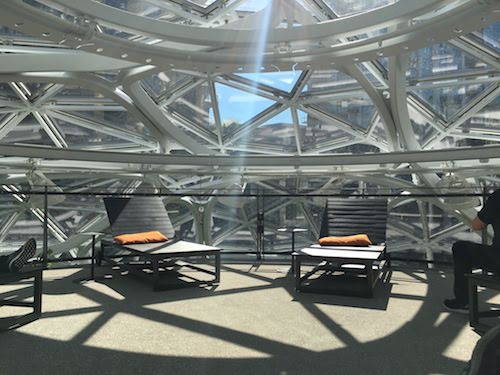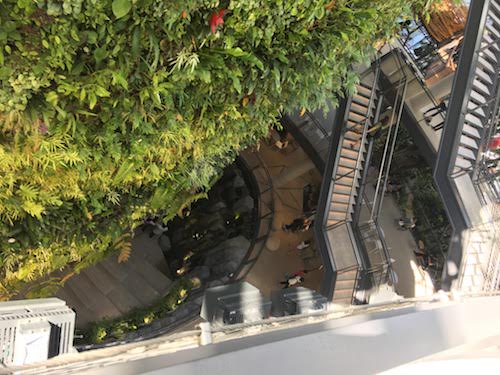Inside Amazon's Spheres
After a false start back in the winter, I finally toured the Amazon Spheres over the weekend. From the outside, the balls look enormous. From the inside, they strike you as much smaller — though it must be said that architects successfully built a lot of surprising nooks and crannies into the building's layout.

When you walk into the Spheres, you see an enormous wall of ferns and ivies and other plants, with nozzles spraying mist intermittently around the building. Follow the stairs up and you'll find a number of places for Amazon employees to sit and work: some couches, a crow's nest, a conference room, some café-style seating around a General Porpoise outlet selling doughnuts for just over four bucks a pop. On the very top of the center ball, you'll find a lounge with deck chairs, on which employees can lounge in the sun and peck away on their laptops.

I'm not very conversant in plants, but I know an expensive specimen when I see it. The lush greenery in the Spheres is gorgeous, and you could very well lose a few hours walking around, breathing in the richly oxegynated air and gazing at all the greens and pinks and yellows. These plants are well cared for.

As I walked around the Spheres with the general public on a sunny Saturday afternoon, I just kept thinking about how expensive everything was — how much it must have cost to build the damn things in the first place, how much all the plants cost, and how high the monthly bill must be to maintain them in such an unnatural environment. I thought about how inflated the costs at the employee snack bars were, and what percentage of those high prices floated back to Amazon.

And then I thought about how hard Amazon fought against the employee head tax, which would have raised funds to house Seattle's rapidly growing homeless population. While it's true that Amazon has contributed to Mary's Place, an amazing local charity that does good work in a city wracked with a housing crisis, it's also true that charitable giving alone isn't enough.
A problem like Seattle's housing crisis, with so many moving parts and so many difficult decisions to make, demands solutions that come from outside both the market and charity sectors. Amazon didn't just say no to that tax — it actively fought against it, a remarkable statement from a company that has traditionally refrained from making controversial public statements of almost any kind.
Look around the Spheres and you'll see what Amazon would rather spend its money on. Something beautiful, for sure, but something incredibly exclusive. Something flashy, something that everyone desires. A status symbol. A place in the middle of a booming city, built on some of the most expensive land on the west coast. A large building in which nobody lives.